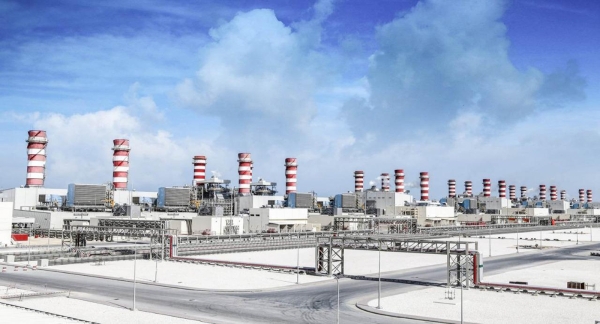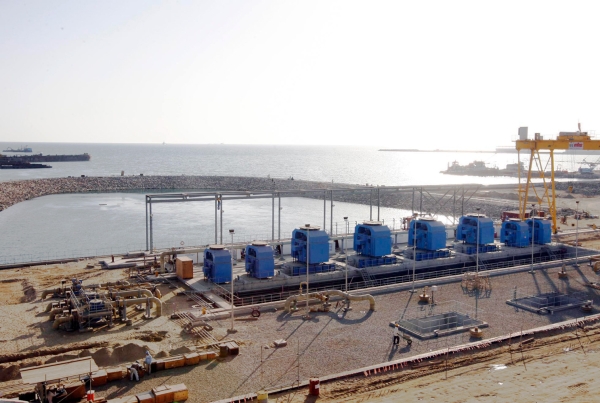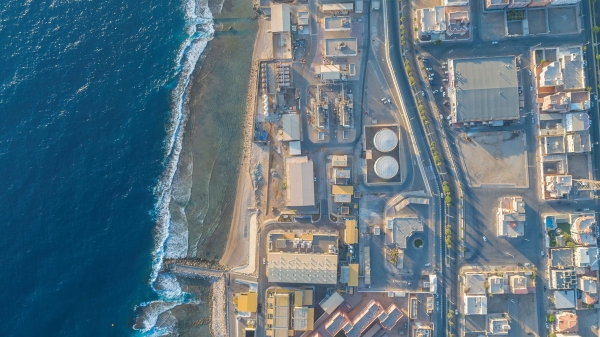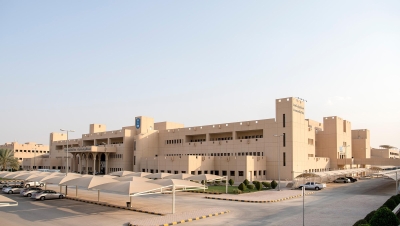



The Production of Desalinated Water in the Kingdom of Saudi Arabia involves treating seawater to address the water deficit and meet the growing demand across the Kingdom. Currently, there are approximately forty-one desalination systems in the Kingdom, consisting of thirty-three public sector systems and eight private sector systems.
Water management in the Kingdom is governed by the Water Law issued in 2020 through a royal decree and Council of Ministers resolution. This law defines desalinated water as seawater that has undergone a desalination process.
Between 1974 and 2023, the Saline Water Conversion Corporation (now the Saudi Water Authority) developed numerous desalination systems along the Kingdom’s eastern and western coasts. In 2023 alone, these systems produced over two billion m of fresh water.
Saudi Water Authority
The Saudi Water Authorityis the entity responsible for managing, operating, and maintaining water desalination systems, repurposing and desalinating seawater, and then pumping it to cities and governorates in the Kingdom. Its headquarters is located in Riyadh City, and the Minister of Environment, Water, and Agriculture chairs its Board of Directors.
In 1974, due to the increasing demand for water in the Kingdom, the Saline Water Conversion Corporation (SWCC) was established by royal decree as an independent government institution with a legal personality. It operates under the Ministry of Environment, Water, and Agriculture. On May 7, 2024, the Council of Ministers approved the conversion of the Saline Water Conversion Corporation to an authority named the Saudi Water Authority.
Water desalination history in the Kingdom
The Kingdom has a long history with water desalination, which began more than 120 years ago with the use of a condensing unit for seawater distillation in 1907, known as al-Kandasa. It was the first desalination unit on dry land to support freshwater sources in Jeddah Governorate. However, this attempt was unsuccessful. Founding King Abdulaziz Bin Abdulrahman Al Saud ordered the importation of two sizeable machines that used the same technique to distill seawater in 1927 in order to sustain freshwater sources in Jeddah Governorate for the service of Hajj and Umrah pilgrims.
Launch of water desalination activities in the Kingdom
Water distribution activities persisted in the Kingdom's provinces at the time. The first phases of desalination, with a daily production capacity of sixty thousand gal per plant, were launched in al-Wajh and Duba Governorates on the Red Sea coast in 1969. Subsequently, the first phase of the Jeddah Governorate desalination plant was inaugurated in 1970 with a daily production capacity of fifty MW and five million gal of water.
Water desalination plants on eastern and western coasts
Groundwater and other water resources are becoming more scarce in the Kingdom as a result of climate change. The country's water needs were estimated at 24.8 billion m in 2015, with an average fixed annual growth rate of 7 percent. With 84 percent of the total water demand, the agricultural sector is the largest consumer of water in the country.
Desalinated water serves as the primary water source in the Kingdom, alongside four other categories: non-renewable groundwater, renewable groundwater, surface water, and treated wastewater. To meet growing water demand, the country has established thirty-five desalination plants along its eastern and western coasts. In 2015, these plants had a total production capacity of 6.28 million m³ per day, which increased to 7.4 million m³ per day by 2020. By 2024, the combined production from both public and private desalination plants reached approximately 11.5 million m³ per day.
The majority of desalination plants in the Kingdom - 73 percent of the existing total capacity - are owned by the Saudi Water Authority. Three main technologies are employed for desalination: multi-stage flash distillation, reverse osmosis, and multiple-effect distillation.
Of these, multi-stage flash distillation is the dominant technology, accounting for 62 percent of the existing total desalination capacity in the Kingdom.
Private sector role in water desalination
The Saudi Water Authority oversees water affairs in alignment with the Kingdom’s goals of ensuring an adequate water supply. One of its key objectives is to bolster natural water resources through desalination. To achieve this, the authority has implemented development plans that include building desalination plants and related infrastructure in areas where water is either scarce, inadequate, or unsuitable, based on economic and technical feasibility studies.
Desalinated water is widely consumed across various sectors, with the industrial sector accounting for the largest portion - approximately 80 percent of industrial water supplies, which also include non-renewable groundwater. The private sector plays a significant role in desalinated water production, currently contributing 23 percent through partnerships, with plans to increase this to 100 percent.
Over time, desalination has become a strategic option for the state in securing water resources. This has led to the expansion of desalination plants along both the eastern and western coasts, including notable facilities such as al-Jubayl plant, the largest desalination facility in the world, along with plants in Jeddah, Makkah al-Mukarramah-Taif, al-Madinah al-Munawwarah-Yanbu, Shuqaiq, and al-Khobar.
The Kingdom's milestones in water desalination
The Kingdom has achieved global recognition in desalinated water production, leading the world in 2013 with nearly one billion m produced annually - a 7.8 percent increase over 2012.
In 2020, the Kingdom led global production with the Saline Water Conversion Corporation achieving the highest production capacity at 5.9 million m per day.
By 2023, the Saudi Water Authority further solidified its global standing by surpassing this record, increasing the daily total desalinated water production from 5.9 million m to 6.3 million m. This increased output is distributed across all regions of the Kingdom.
Water strategy in the Kingdom
In line with the Saudi Water Authority’s commitment to regulating production and operations, it has developed a comprehensive strategy to enhance its desalinated seawater production systems. This strategy focuses on increasing production capacity while upholding the highest quality standards and ensuring environmental protection. As part of this initiative, in 2018, the authority upgraded the Khafji field production system, transitioning from liquid fuel technology to reverse osmosis technology, which offers lower material costs and reduced energy consumption.
It continued to advance its technologies and stay current with production developments by decommissioning the Jeddah (Phase IV) and Yanbu (Phase I) production systems, which used liquid fuel, in 2019. During this process, it upheld its contractual obligations to employ highly efficient operational maneuvers for desalinated water transport systems and provided alternative quantities from more efficient production systems. In 2020, the company also completed a project to replace desalination technologies in small production systems along the Red Sea coast.
Development of desalinated water production in the Kingdom
The production development work included the initiation of initiatives to replace the main thermal technology systems that use liquid fuel with new systems employing reverse osmosis technology. This transition affects al-Khobar (Phase II) and al-Jubayl (Phase I) systems, which were completed in the latter half of 2022, as well as upcoming projects for al-Shuqaiq (Phase I) and al-Shuaiba (Phase I) systems, which will enter service in the future. and al-Jubayl (Phase II), which began production in 2022.
In alignment with the water strategy, the Saudi Water Authority is working to phase out the remaining liquid-fuel-based production systems. The Yanbu production system (Phase II) will be decommissioned following the introduction of the private sector’s al-Rais system in the first half of 2023. Similarly, the Rabigh production system will be removed after the completion of the private sector’s Rabigh (Phase III) system at the end of 2021. Additionally, there are plans to replace the Shuaiba production system (Phase II), which currently uses liquid fuel, with a reverse osmosis-based system.
Increased production and technological development of water desalination
Technical advancements and expansion efforts in desalination plants led to an increase in total desalinated water production, rising by approximately sixty million m³ per day in the first half of 2021 compared to the same period in the previous year. Currently, forty-two projects are underway, including seven new desalinated water production systems. These projects are expected to add 3.678 million m³ of desalinated water daily to Riyadh, the Eastern Province, Makkah al-Mukarramah Provinces, and the southern region.
In an attempt to transfer technology and localize productive knowledge in the field of water desalination, the SWCC (currently the Saudi Water Authority) signed a contract in 2021 with Saudi Services for Electro Mechanic Works (SSEM), and Metito Saudi Ltd. The contract stipulated the replacement of outdated technologies and assets in al-Jubayl desalination production system (Phase II) with reverse osmosis technology. This technology is the most cost-effective and eco-friendly. It produces one million m of desalinated water per day to supply Riyadh Province, and is set to start production in 2024.
In 2023, the Saudi Water Authority advanced its production efforts by enhancing the water supply through the launch of desalinated water production from al-Jubayl system (Phase II). This new development project uses eco-friendly reverse osmosis technology and is designed to meet the rising demand for water, with a daily production capacity of four hundred thousand m of desalinated water.
Desalinated water production systems
Over forty-nine years (1974-2023), the Saudi Water Authority developed numerous desalination systems along the eastern and western coasts of the Kingdom. By 2023, the total freshwater production surpassed two billion m, supported by thirty-three production systems. The daily production capacity for desalinated water is 7.5 million m, with al-Jubayl, Ras al-Khair, and Shuaiba being some of the largest desalination systems globally.
By 2024, the number of seawater desalination systems increased to forty-one, including thirty-three public sector systems and eight private sector systems. The combined daily production from these plants in the Kingdom reached 11.1 million m, with the public sector contributing 7.5 million m and the private sector 3.6 million m.
Water desalination projects in the Kingdom
Adsorption Desalination Plant
It is one of the energy projects in Saudi Vision 2030, and the world's first industrial-scale application of adsorption cooling technology for water desalination, coupled with industrial-sized salt crystallization. It produces about five thousand m of desalinated water daily. It was inaugurated on February 21, 2017, and is located in al-Uyaynah, which is administratively affiliated with Diriiyah Governorate.
The plant was constructed to achieve sustainable development in the water sector, develop water resources, and conserve the environment, in line with the goals of Saudi Vision 2030. The desalination plant works to achieve the principle of zero salt return, reduce the negative impact on the environment resulting from operating desalination plants, and raise overall efficiency.
Solar-powered seawater desalination project
The project aims to desalinate water and tackle the challenge of water scarcity by harnessing the Kingdom's abundant solar resources. As a Saudi Vision 2030 project, it was launched under the Custodian of the Two Holy Mosques’ initiative to use solar energy for seawater desalination. The project was inaugurated in 2018 by Crown Prince and Prime Minister, His Royal Highness Prince Mohammed Bin Salman Bin Abdulaziz.
The solar-powered seawater desalination project consists of two sub-plants, one for desalination using reverse osmosis technology and the other for electricity production using solar photovoltaics.
The reverse osmosis plant uses techniques developed by King Abdulaziz City for Science and Technology for efficient and cost-effective desalination of water. The capacity of the desalination plant is sixty thousand m/day, with peak production of ninety thousand m/day. The solar power plant provides ten MW of daily electricity to operate the desalination plant.
Related quizzes

